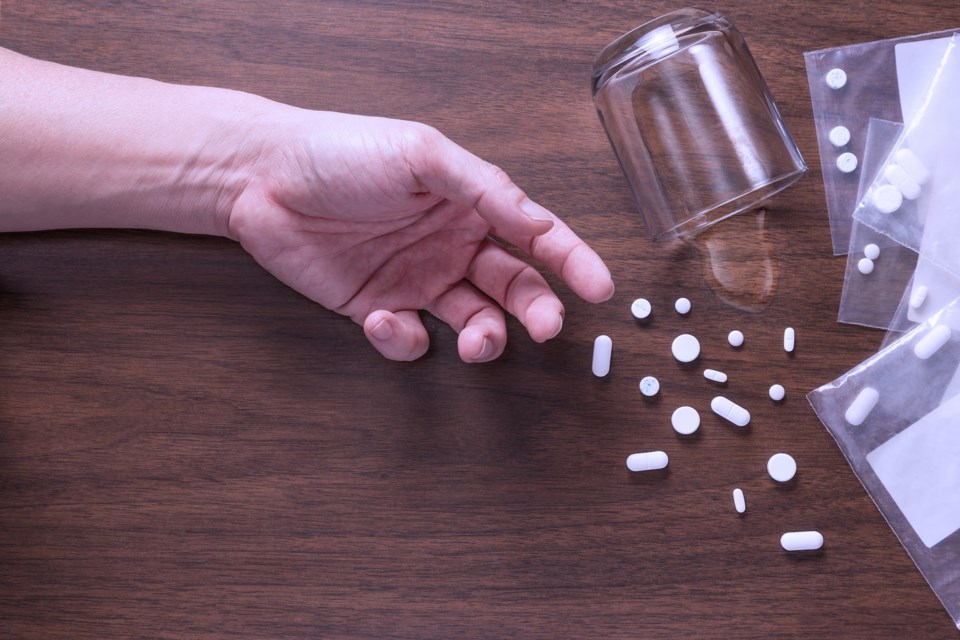Local health officials are raising the alarm after the region experienced nine suspected drug poisoning deaths in one week.
Those deaths occurred in Simcoe Muskoka during the week of Feb.18, with seven of the deaths occurring in Barrie and Innisfil, noted an email sent to Simcoe Muskoka District Health Unit (SMDHU) staff on Feb. 29.
“Our thoughts are with all those impacted by these tragic losses,” stated the email sent on behalf of Mia Brown, program manager of the SMDHU's substance use and injury prevention program, and Cathy Eisener, a public health nurse with the program
In the email Brown noted she welcomed any insight colleagues could share that they’d heard from members of the community accessing services related to their experiences with the current unregulated supply.
She also urged them to check their Naloxone supply to ensure they have enough on hand.
According to the heath unit's website, during that same week in February, there were reportedly 17 emergency room visits related to suspected overdoses.
“It’s tragic,” Eisener acknowledged.
While naloxone will work to reverse the opioid component when an overdose occurs, it does not work to reverse the effect of the many other drugs that are currently being mixed into the unregulated supply.
“The naloxone will reverse the fentanyl that’s in there, but it is ineffective against any of the benzodiazepines and the newer veterinary tranquilizers that are being added to the supply like medetomidine and dexmedetomidine,” she said.
“It’s just such a powerful tranquilizer and people just aren’t waking up. Because it does suppress the respiratory system as well, they’re needing a lot more support to keep them breathing, Eisener explained.
During the first eight months of 2023, the region saw 98 deaths, higher than the same period the previous year, she noted.
“November, that was a rough month. We unfortunately lost a lot of folks that month. It’s not just about the numbers, it’s about people’s lives. They have family and community and friends. How are people dealing with loss after loss in their community? It’s tough.”
One death is one too many, acknowledged Peter Leon, who works as the communications coordinator for Barrie Police Service.
“It impacts so many people. It’s one of those things where it’s friends, family, colleagues ... and people close to them now have to deal with the loss of a loved one,” said Leon.
The unregulated drug supply making the rounds, he acknowledged, is getting closer to home every day.
“We know from other communities — Belleville being one of them and Montreal, too — that there is a very potent batch of fentanyl out there that unfortunately Naloxone won’t give you that chance to get medical help. It just doesn’t have the reversal effect (it normally would have),” he said.
Given the deadly unregulated drug supply that has been making its way into the region, the next dose, he said, could be a person’s last.
“That sounds horrific, but that’s what we are dealing with. You just don’t know (if) this dose has something in it that is going to cost (a person their) life. It’s a very high-risk style people live when they’re using drugs of this type. They are dangerous and certainly very deadly," said Leon.
Even recreational drug users are not immune to deadly drug supply, he noted.
“We’ve certainly seen it in the past when fentanyl was slowly being introduced into the area as another drug that was available. Cannabis, before it was legalized, was being dusted … by individuals looking to create the next level of addiction,” he said. “Sadly, we know what the outcome of that has been. They don’t call fentanyl ‘a dose of death’ loosely. It’s called that for a very specific reason."
Leon’s advice, first and foremost, would be simply “don’t do it.”
“I know it’s easy to say ... but for those who are experimenters, it’s not worth taking the chance. Regrettably, those who are addicted to drugs need to be very careful and cautious," warned Leon. "They have to understand – and I think they do — that the next dose could be their last dose.”
The ability to fight this battle is hard, acknowledged Eisener.
“We are so limited to what we have available to us. We don’t have all the tools that some of the bigger cities have. We don’t have a consumption services treatment site and because of that we don’t have drug checking (and) folks can’t see what’s in their drugs in order to make those informed decisions,” she said. “We can just offer those harm reduction messages we’ve been pushing all along.”
The health unit is urging people to:
- Carry Naloxone and know how to use it
- Use with a friend or a partner ensuring one person is available to respond to a poisoning
- If alone, use the National Overdose Response line if possible: 1-888-688-6677
- Start low with a test dose and increase slowly
- Try to use only one substance at a time
- In the event of an overdose call 9-1-1



